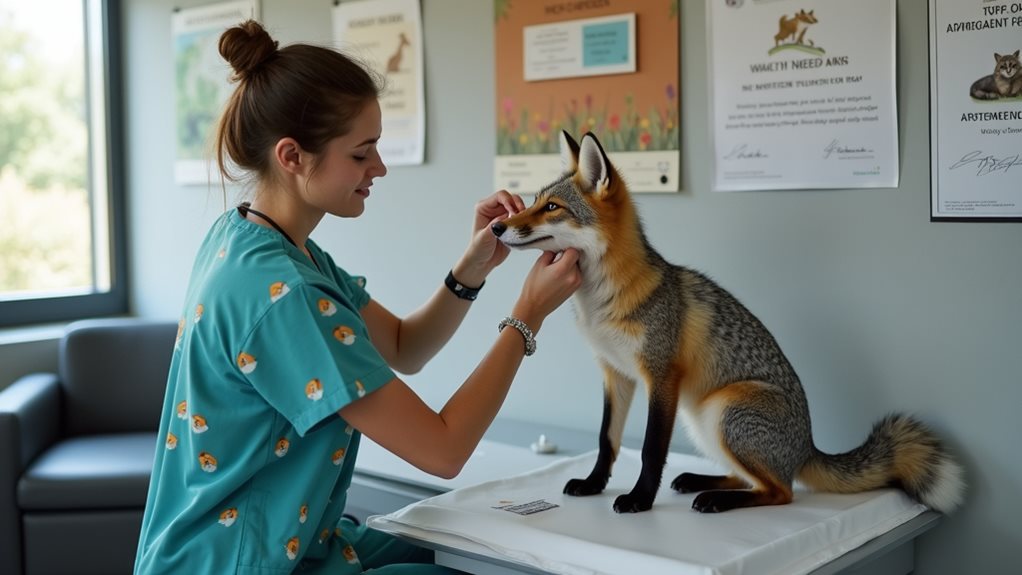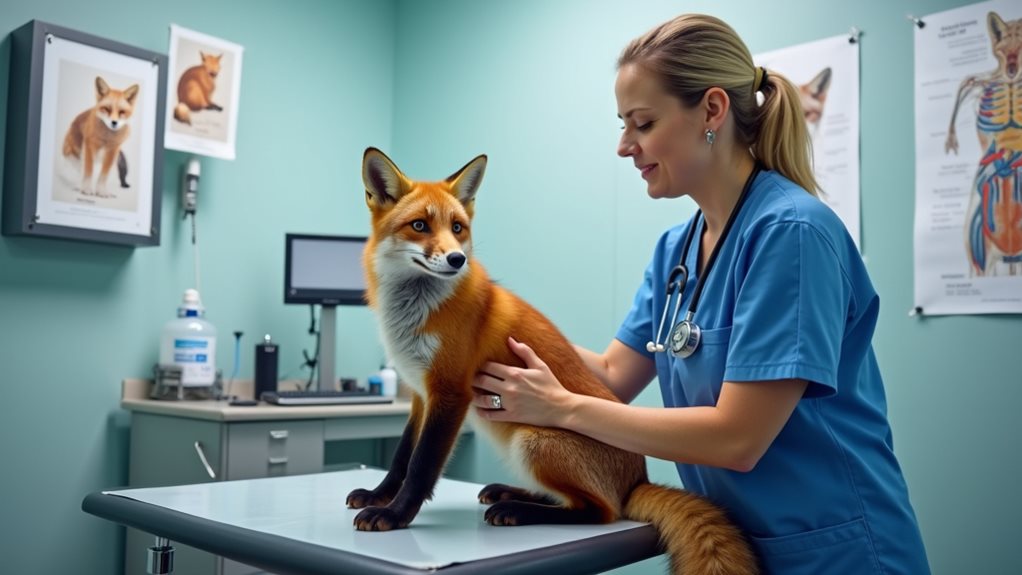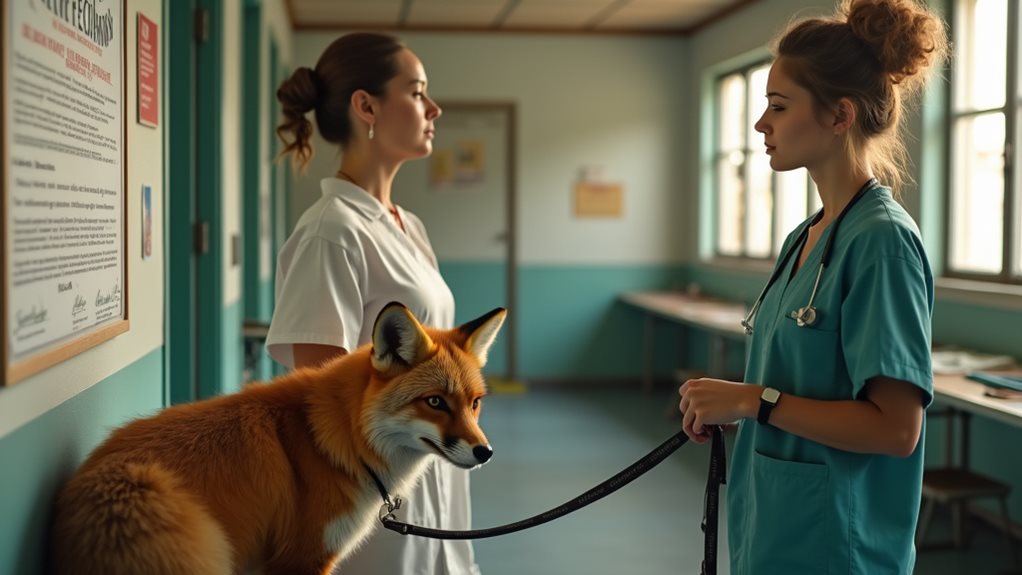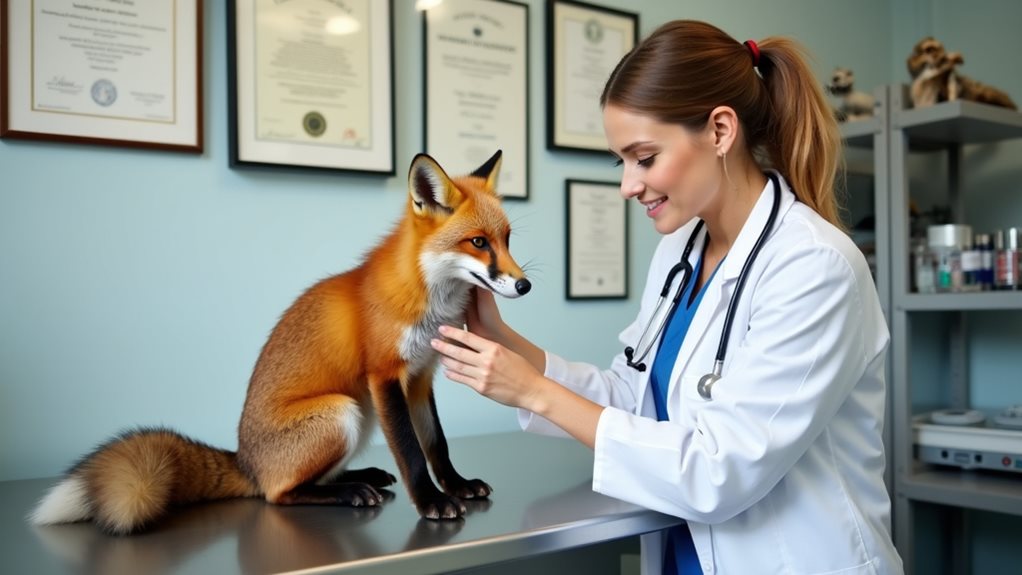To choose the right fox veterinary specialist, look for vets with exotic animal certifications and specific fox experience. Don’t settle for regular pet doctors who treat foxes like dogs. Ask about their knowledge of fox nutrition, behavior, and common health issues. Check for proper handling techniques and appropriate facilities. Contact exotic animal associations and connect with other fox owners for recommendations. A good specialist will understand your fox’s unique needs and create a customized preventative health plan that keeps your furry friend thriving.
Contents
- 1 Understanding Fox-Specific Veterinary Needs
- 2 Qualifications to Look for in a Fox Specialist
- 3 Finding Exotic Animal Veterinarians With Fox Experience
- 4 Questions to Ask During Your Initial Consultation
- 5 Red Flags When Evaluating Potential Fox Veterinarians
- 6 Creating a Preventative Health Plan With Your Fox Specialist
- 7 Final Thoughts
Understanding Fox-Specific Veterinary Needs

Why would you need a specialized vet for your pet fox? Unlike cats and dogs, foxes have unique health requirements that ordinary veterinarians mightn’t understand. Your fox deserves care from someone who recognizes their specific needs!
Foxes require specialized dietary requirements that balance proteins, vitamins, and minerals differently than traditional pets. A fox-savvy vet will help you create a proper nutrition plan to prevent health issues down the road. Additionally, they can provide insights based on the fox’s high energy levels, ensuring your pet remains engaged and mentally stimulated.
They’ll also conduct thorough behavior assessment sessions to identify potential problems before they become serious concerns.
Qualifications to Look for in a Fox Specialist
When searching for a fox-specific veterinarian, you’ll want to prioritize professionals who hold advanced wildlife certifications that demonstrate specialized knowledge of exotic species.
Look for vets with substantial exotic animal experience, particularly those who’ve worked with foxes or similar wildlife in zoos, wildlife rehabilitation centers, or specialized practices.
These qualifications guarantee your fox companion receives care from someone who understands their unique anatomy, common health issues, and specialized nutritional needs.
Advanced Wildlife Certifications
Selecting a veterinarian with specialized wildlife certifications becomes crucial if your fox needs medical attention.
While standard veterinary training covers domestic animals, exotic pets like foxes require additional expertise. Look for vets who’ve earned advanced certifications in wildlife medicine or have completed wildlife rehabilitation training programs.
These specialized credentials indicate that your vet understands the unique anatomy, behavior, and medical needs specific to foxes. They’ll know proper handling techniques, medication dosages, and nutritional requirements that differ from cats or dogs.
Don’t hesitate to ask potential vets about their wildlife experience! A qualified fox specialist should proudly share their training background and explain how their advanced certifications prepare them to treat your unusual pet.
Exotic Animal Experience
Beyond specialized wildlife certifications, a vet’s hands-on experience with exotic animals makes all the difference in your fox’s care.
Look for veterinarians who’ve regularly treated foxes or similar exotic species for at least three years. These professionals understand the unique dietary requirements that foxes need—a critical factor many general vets might overlook.
Ask potential vets specific questions about fox behavioral traits they’ve encountered.
A knowledgeable fox specialist can tell you stories about managing your pet’s natural behaviors, like caching food or scent marking. They’ll also recognize subtle signs of stress or illness that might escape an untrained eye. Additionally, they should have an understanding of dietary variety essential for maintaining your fox’s health.
Finding Exotic Animal Veterinarians With Fox Experience

Why is finding a vet who specializes in fox care so challenging for exotic pet owners? The truth is, most veterinarians receive limited training with foxes during their education, making specialists rare. Your fox deserves care from someone who understands their unique fox behavior and habitat needs.
Don’t be discouraged! Start by contacting exotic animal veterinary associations in your area. They often maintain lists of vets with specialized experience.
You’ll also find valuable connections through fox owner forums and social media groups where members share recommendations.
When interviewing potential vets, ask specific questions about their fox experience: How many fox patients do they treat annually? Do they understand the dietary requirements and common health issues?
A knowledgeable vet won’t just treat symptoms—they’ll consider your fox’s natural behaviors and environmental needs.
Questions to Ask During Your Initial Consultation
Once you’ve located potential veterinarians for your fox, preparing thoughtful questions before your first visit will help determine if they’re truly the right fit.
Ask about their specific experience treating foxes and what percentage of their practice involves exotic animals. Don’t forget to inquire about their approach to preventative care and emergency protocols.
It’s also smart to discuss practical matters like whether they accept pet insurance for exotic pets and their system for maintaining detailed health records.
Find out how they handle follow-up care and if they provide 24/7 emergency services. Ask if they collaborate with wildlife specialists when needed and what their typical treatment plan looks like for common fox ailments.
Additionally, understanding their knowledge of endangered fox species can indicate their commitment to specialized care.
These questions will give you confidence that your furry friend will receive the specialized care they deserve.
Red Flags When Evaluating Potential Fox Veterinarians

While searching for the right veterinarian for your fox, you’ll need to stay alert for warning signs that indicate a practice mightn’t be suitable for your exotic pet.
Trust your instincts—if something feels off, it probably is. A veterinarian who’s right for your fox should understand their unique needs.
- Dismisses questions about specific fox behavior patterns or treats them like dogs
- Shows limited knowledge about fox dietary requirements, including necessary nutrients
- Can’t provide references from other exotic pet owners
- Lacks proper equipment or facilities for treating foxes
- Seems uncomfortable or overly cautious when handling foxes during examination
Additionally, ensure that the veterinarian is aware of health concerns associated with foxes, including the risks posed by rabies to unvaccinated pets.
Creating a Preventative Health Plan With Your Fox Specialist
After finding a qualified fox veterinarian, your next priority should be establishing a thorough preventative health plan.
This roadmap will keep your fox healthy and happy for years to come, addressing potential issues before they become serious problems.
Work with your specialist to create a plan that includes regular check-ups, vaccination schedules, and parasite prevention customized to your fox’s specific needs.
Don’t forget to discuss dietary considerations—foxes require specialized nutrition that changes as they age.
Your vet should also perform regular behavioral assessments to catch any concerning changes early. Understanding genetics and behavior is crucial for tailoring an effective health plan.
Final Thoughts
You’ve now got all the tools to find the perfect vet for your fox friend. Yes, it might take more effort than finding a cat or dog doctor, but your fox deserves specialized care that understands their unique needs. Make those phone calls, schedule consultations, and trust your instincts. Your fox will thank you with better health and many more years of those mischievous antics you’ve grown to love.













